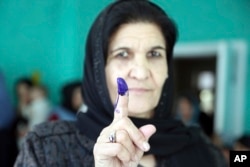Sunday was the second of the two days that voters in most of Afghanistan had the opportunity to cast their ballots in parliamentary elections.
Election officials say four million of the nearly nine million registered voters turned came out to the polls Saturday and Sunday, despite the challenges that included polling stations that never opened and technical problems with voting equipment.
The voting was marred by violence.
The French news agency AFP says its tally of casualty figures of civilians and security forces killed or wounded in polling-related violence on Saturday was nearly 300, a figure the agency says is more than four times higher than the latest figures released by the interior ministry.
The Taliban had issued repeated warnings that they would attack polling stations and all election-related activity.
Afghan President Ashraf Ghani thanked the voters Sunday in a televised address. "Afghans did not only show their enemies that they would not surrender to any threats or warning, but that they also have the power and will to defeat their enemies," the president said.
The final results will not be known for weeks.
Voting in the southern province of Kandahar has been postponed until October 27, after the assassination Thursday of influential commander General Abdul Raziq that was claimed by the Taliban.
Elections in Ghazni were postponed until next year due to political disputes among the local population.
The last few months in Afghanistan have been wracked by election-related violence. Ten candidates have died in various attacks across the country, along with dozens of their supporters, since the beginning of the nomination period in late May.
The government responded to the security concerns by deploying 70,000 security personnel around the country to safeguard 5,100 polling stations. The original plan was to operate more than 7,000 polling stations, but was changed due to security concerns and high threat alerts in several areas.
About 132 observers from various countries and the European Union joined close to a half-million local observers. Many of them were agents of candidates or political parties, civil society activists, and other groups monitoring the elections.
More than 2,500 candidates were competing for the 249 seats in the next parliament. Some 400 female candidates competed for 68 seats reserved for women.
The parliamentary elections are the first elections, since the fall of the Taliban, that have been primarily managed by the Afghan government.






